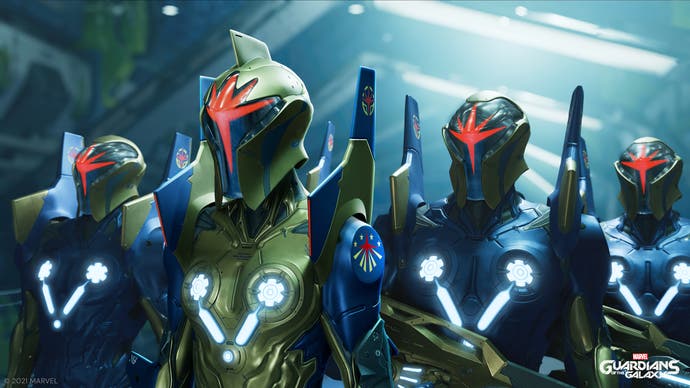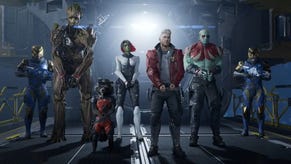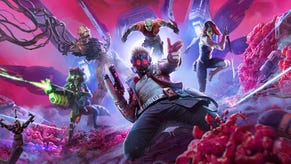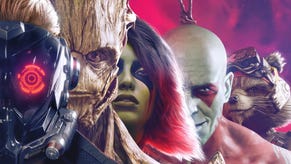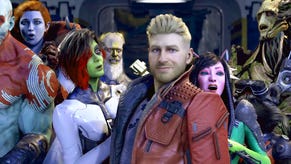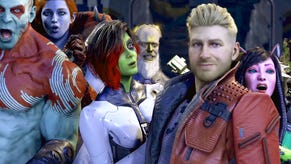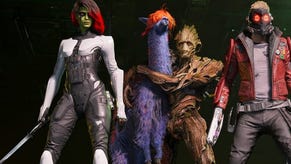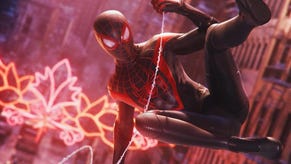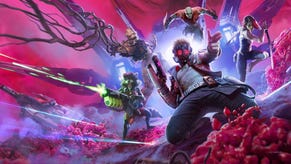Marvel's Guardians of the Galaxy is rather messy, just like its star players
An hour with Eidos Montréal's take on Marvel's most dysfunctional roster.
The Guardians of the Galaxy are a band of messy, dysfunctional, often self-centred, always bickering individuals who spend about as much time travelling the cosmos cleaning up their own mistakes as they do other people's. They're irritable and they're pig-headed, but when push comes to shove, they get the job done, and it's exactly this dynamic that makes them completely unique and sometimes more relatable than the comparatively virtuous Avengers. But how do you translate that key element of who the Guardians are into a video game? We recently had the chance to get a hands-on with Marvel's Guardians of the Galaxy - the latest single player cosmic comic book-inspired adventure from Eidos Montreal - and we have to say, it doesn't look easy.
Our hands on was about an hour long and took place in Chapter 5 of the game. The Guardians are locked in something of a legal dispute with the Nova Corps, to whom they owe a pretty big fine, so they're headed to the spirit of Xandar AKA The Rock - a Nova outpost - to smooth things over. Prior to this point in the story, they've been in contact with Ko-Rel, a Nova centurion, and her daughter Nikki, who asks for the team's help at the Rock as something strange seems to be going on there. (Side note for comic fans: while there are two distinct comic book characters with Guardians of the Galaxy and Nova Corp affiliations with these names, they seem to be reimagined for this lore.)
Anyway, before the team head out for the Rock, you're able to spend some time with them in their ship, the Milano. Here you can wander around, play songs on the jukebox, have Rocket craft perks from components you've picked up on adventures or explore your teammate's rooms and interact with their belongings to find out a little more about them. It's clear that this is a very different take on some of characters than in the Marvel Cinematic Universe; several backstories are more akin to their classic comic book arcs. For example, this version of Thanos, who Gamora mentions briefly, is in love with Lady Death - literally the physical embodiment of death - which is historically what drives him to do the things that he does. Peter Quill, meanwhile, is the heir to the Spartax empire, which he also mentions casually in conversation on the Milano, as you do. Some things the game does give its own original spin on, however. It reimagines Quill's moniker Star-Lord as an 80s band he idolises, and the team at Eidos Montreal actually created an entire extremely 80s-metal Star-Lord album from scratch, which is played throughout the game. Tracks include Space Riders (With No Names), No Guts No Glory, and The Darkness Inside. Think Metallica, Iron Maiden and Megadeth - all big hair and searing guitar solos.
The Milano is a great-looking space that does well to expand on each character's personality via their individual little areas, but the way in which dialogue is opened up with your teammates often feels wooden - you pick up an item and they just appear behind you, ready to reel off some exposition with a couple of basic dialogue options. It probably doesn't help that this game was developed in the midst of a pandemic, but the voice acting can come across as technically and emotionally uneven in these moments, and it makes a lot of interesting - admittedly optional - backstory a bit of a slog to get through.
The aforementioned workbench is a handy spot on the ship where you can trade in crafting parts for equipment upgrades and perks designed and built by Rocket. Crafting parts will be hidden throughout the world as you explore, and generally speaking it doesn't seem too difficult to stay stocked up. The development team said of the perks that they didn't want players to worry about missing out on anything special, and so they designed them specifically as upgrades to abilities that you'll already have unlocked - they'll offer faster cooldowns and health/stamina regen for example, allow you to float in the air a bit longer, that sort of thing. It's a nice idea to keep exploration stress-free and accessible, but we do hope it doesn't ultimately make the perk system feel shallow in the final game.
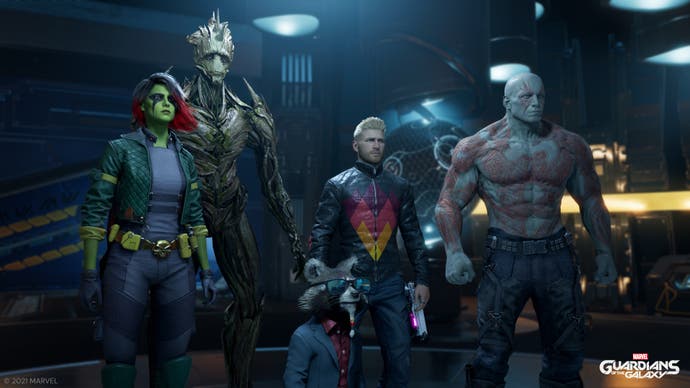
Once the team hyperjumps through space in their own vibrantly neon way, they arrive at the Rock, the Milano is clamped and docked (standard procedure for the Nova Corps) and they explore the bizarrely deserted outpost. There are no Centurions to be seen at first, just robots running on autopilot, though the Guardians do come across Jack Flag still trapped in a holding cell - and the player is given a choice whether to try and release him or not. We weren't able to see any kind of resolution to this choice, but perhaps it'll open up gently deviating storylines later in the game.
There are a few moments like this in the demo, where choices are offered up with the potential to change the course of your story. The biggest one in an immediate sense is when the team comes across an abandoned Centurion helmet, and putting it on his head, Quill can hear comms from the other end. You can choose to either engage the voices or stay silent, which will impact how the Guardians enter into battle a little later. Choosing not to speak means they're able to get the jump on the enemies, but speaking into it - as we did - means that they very kindly come to you with the promise of help.
Once they arrive, though, it becomes clear that something is not right - if their monotone insistence that the Guardians give thanks to a mysterious figure known only as the Matriarch didn't give them away, then the eerie purple aura around their heads definitely would.
It's here that the demo launched us into combat. You control Star-Lord exclusively but can issue orders to the other team members, who each have their own areas of speciality: Drax does the most stagger damage to enemies, Gamora does the most health damage, and Groot immobilises foes with his vines while Rocket does damage from afar and can also initiate area-of-effect attacks. As Quill, you can use your Jet Boots to zoom around the battlefield, you can get in close for punchy melee attacks, and you can add elemental damage to your pistols - ice seemed to work best against the waves of entranced Nova Corps. Melee attacks can hit hard, but they also come with the possibility that foes will retaliate - some of the Corps we faced off against would stop our punches mid-strike and send another back at us, giving us a very fleeting opportunity to hit a button at the right time and recover, or be knocked flat on our bum. There are similar skill checks in place with your pistols - they technically have unlimited ammo but, in the grand tradition of futuristic weaponry, they can overheat. When this happens, a moving gauge will appear over your reticule and if pressed at the right time, you'll Override the overheat and be able to keep firing indefinitely. Misfire, and you'll be without your weapons for a few seconds.
Enemies have a secondary stagger bar underneath their health bar, and when that's filled, they will be momentarily completely immobilised. Some enemies will also have additional shields that you'll need to figure out how to bypass too. While in combat you build up Momentum, which is visible by a bar on the left side of the screen. Building this means you are more likely to trigger a call to action - a collaborative Flair attack from one of the Guardians generally executed on PlayStation by pressing triangle and circle together when a prompt appears on screen. Team Flairs are also triggerable and see the guardians essentially all gang up to bully one poor foe in particular. On top of that, there are opportunities for Quill to order teammates to trigger environmental attacks like flinging exploding red barrels at enemies or dropping some scaffolding on their head.
Then you have the Huddle, a sort of ultimate attack that you'll eventually activate by pressing L1 and R1 together at the right time. This will then bring you out of the fight entirely, putting you into Quill's first-person view as the other Guardians crowd around you. They'll then put across a few statements, with some of their spoken words appearing on screen. You then have to assess their current emotional state and choose a reply that will suitably invigorate them, pull them in line, or otherwise inspire everyone to keep going. Choose the correct option, and once you get back into the fight Star-Lord will turn up his music and everyone's damage will be temporarily doubled. Choose incorrectly and only Quill's will be. It's an... odd decision in a game that literally has a Momentum gauge to pull you out of your flow for a few seconds for a multiple choice conversation before letting you back to the fight, and we're not entirely sure that it works. But, if the double damage doesn't inspire you to keep going then the Classic Rock soundtrack definitely will.
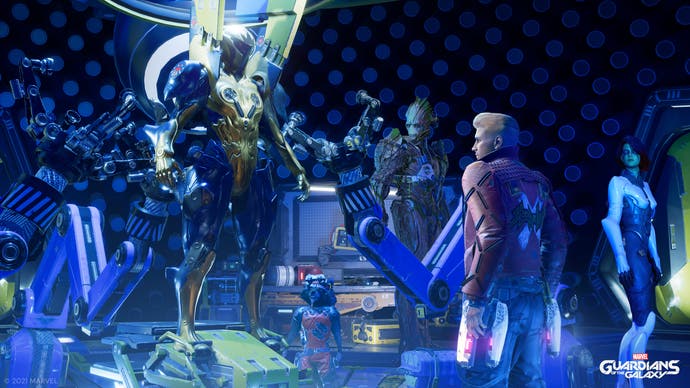
If the above combat breakdown all sounds like a lot, that's because it is. It's extremely overwhelming, and it didn't really help that our demo was a little ways into the game and we weren't able to warm up with a bit of a tutorial beforehand. Once the Guardians started fighting on the Rock, there were waves upon waves of enemies to get through, and it just felt like a bit too much happening at any one time - even with time slowed down slightly when you're in a menu to issue orders to teammates. In all honesty that part is fairly basic - characters have a different attack mapped to each of your controller's face buttons. It's more that there are so many different microsystems at play at any one time in combat, and none of them seemed to really click together all that well.
That lack of cohesion stretches to the Guardians themselves - it seems like the team can never really agree on whether they're using their indoor or outdoor voices in any given conversation and as a result, it feels like there's not much connection or chemistry to their group. Gamora in particular falls pretty flat compared to other incarnations of the deadliest woman in the galaxy. During our demo, Peter and Rocket have had a falling out and are constantly sniping and snarking at one another - it's understandable that the developer wants to build the idea of a team still finding their feet and learning to live with one another, but in this section at least, it just becomes incredibly grating, and it's hard to see why they'd bother sticking together at all.
Once the Guardians discover that an enigmatic cult known as the Universal Church of Truth are performing weird ritualistic ceremonies in the Rock, they (sensibly) decide to get on out of there, but must first fight through waves of Nova Corps to release the Milano from six clamps holding her to the docking bay. The development team ambitiously refer to sequences like this as 'comzzles' - combat sequences that have additional puzzle objectives to complete simultaneously, like shooting the clamps off the Milano. After each battle, you'll receive XP that goes towards ability points that can be spent on any of the Guardians, including Quill.
There weren't really many mechanical elements on offer in this short gameplay demo of Guardians of the Galaxy that we hadn't seen before. A few environmental puzzles or obstacles had Quill either asking a teammate to open the way - sometimes you had to think to ask them twice before the story could progress - or using the elemental aspects of his guns to, for example, freeze a doorway in place. It's all pretty standard stuff, so it's a shame these exploration sequences also didn't really allow for getting to know the team better - there was some repeating dialogue and a couple of minor audio glitches. That said, it's important to note that this is still a work in progress and a project that's been worked on throughout the pandemic, so some small issues are probably to be expected.
There's definitely potential there with Guardians of the Galaxy; it's certainly done its homework as far as the comics are concerned - there's even a character bio page in the menu that delves into everyone's publication history - but the demo we played was hamstrung by pacing issues, a steep learning curve and slightly too chaotic combat, and the as-yet unconvincing chemistry of its main players. It's one thing to be dysfunctional, but we've yet to see the Guardians of the Galaxy really put the fun back in there.
